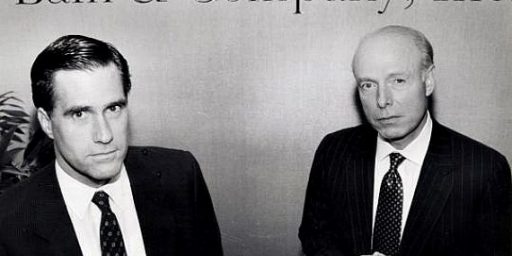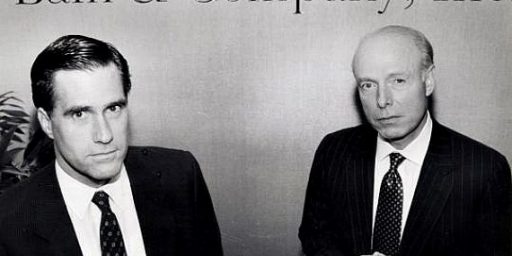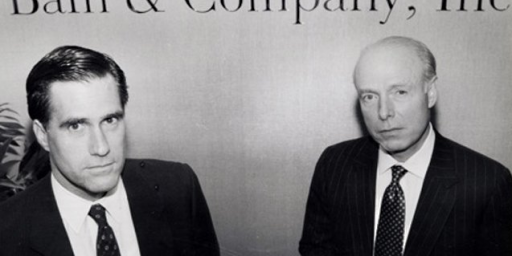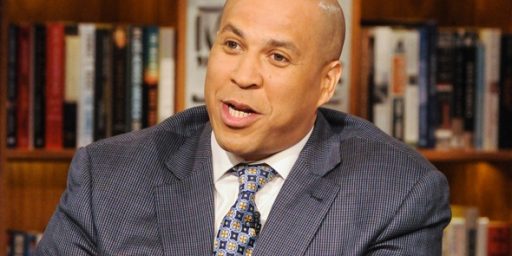Should Presidential Candidates Be Expected To Release Their Tax Returns?
There's no law requiring Presidential candidates to release their tax returns. Should they be expected to do it anyway?
As we’ve noted here at OTB in posts today and yesterday, Mitt Romney has spent the last several days stumbling over the questions that have arisen about his income tax returns, what’s in them, and when or whether he would release them. Last night, National Review came out and called upon Romney to release his returns sooner rather than later:
While we won’t know until we see the records, we can adduce little that could be contained therein that would cast doubt on Romney’s ability to execute the office of the presidency, or his ability to execute it better than Barack Obama. Romney took no salary as Massachusetts’s governor and none as head of the Olympic Games, and signed on to turn around Bain & Company for a dollar. He reportedly tithes, and, through a fund administered with his wife, has given millions to charity, including the proceeds from his book. If his effective income-tax rate is in fact 15 percent, it would exceed the effective rate paid by the average American. That most of his income is taxed at lower, capital-gains rates is not the result of some arcane loophole, but a core feature of the United States tax code. Not even President Obama is calling for capital gains taxed at regular income rates.
But if there is something troubling — or at least politically exploitable — in Romney’s returns, ’twere best it be known quickly. As Perry put it when he confronted Romney on the issue, since Republicans “cannot fire our nominee in September,” it is critical that Romney release his tax records now, that voters might “take a look and decide if we’ve got a flawed candidate.” We know that should Romney become the nominee, he will be criticized over the sources of his wealth and will have to effectively respond. Republican primary voters deserve to see whether he can do so before they vote.
If he is to be the nominee, a speedy release benefits Romney, as well. If he discloses tomorrow, he will have secured the time and space necessary to exhaust the present attacks on his wealth and craft a counter-narrative. If he waits until April, or beyond, he will have ensured that the attacks reach a fever pitch just in time for the Obama campaign to make them a centerpiece of its reelection class war.
As a political matter, the editors at NR are absolutely right. At this point, Romney has already committed to releasing his tax return but he seems to think he can wait until April to do it. Now, if it’s a question of his 2011 return not being ready yet then that’s one thing. However, the questions about his finances are going to continue whether the return is released or not so it seems wise to get something out there as soon as possible. If the 2011 return isn’t available yet, then release the 2010 return at least and deal with the issues now rather than at some point further down the road. Otherwise, the drip-drip-drip of speculation and rumor is just going to continue.
There has been some speculation that one of the reasons that Romney may be reluctant to release his returns is because they will reveal the extent of his tithing to the Mormon Church, including not insignificant amounts of Bain Capital stock over the years:
Underscoring the prominent, if little discussed role that Mitt Romney played as a Mormon leader, the private equity giant once run by the GOP presidential frontrunner carved his church a slice of several of its most lucrative business deals, securities records show, providing it with millions of dollars worth of stock in some of Bain Capital’s most well-known holdings.
Romney has always been a major donor to the Church of Jesus Christ of Latter-day Saints, which requires that members “tithe,” or give 10 percent of their income to the church. His family charity, called the Tyler Foundation, has given more than $4 million to the church in the past five years, including $1.8 million in 2008 and $600,000 in 2009. But because Romney, whose fortune has been estimated at $250 million, has never released his personal tax returns, the full extent of his giving has never been public.
Newly uncovered stock contributions made during Romney’s Bain days suggest there is another dimension to Romney’s support for the church — one that could involve millions more than has been previously disclosed.
As part of just one Bain transaction in 2008, involving its investment in Burger King Holdings, filings with the Securities and Exchange Commission reveal that an unnamed Bain partner donated 65,326 shares of Burger King stock to the Church of Jesus Christ of Latter-day Saints, holdings then worth nearly $1.9 million. And there were numerous others, giving the church a stake in other Bain properties, such as Domino’s Pizza, the electronics manufacturer DDi, the phosphates company Innophos Holdings, and Marquee Holdings, the parent to AMC Theaters.
All of this would be tax deductible, of course, so in addition of bringing Romney’s faith to the center once again, it would also play a role in the overall issue of his tax liability. There’s nothing wrong with it, of course, and donations to a mainline church should not be controversial in and of themselves, but it underscores the fact that releasing the returns will expose Romney not only on financial matters but also on the far touchier subject of religion.
There’s a broader question though, and that is whether any candidate should have to release their tax returns at all. As I’ve noted, there is no legal requirement that Presidential candidates release those records and, for a long time, no candidate ever did. According to some reports, the first candidate for President to do so voluntarily was George Romney in 1968, who released nearly more than a decades worth of tax returns as part of an effort to answer questions about the wealth he’d accumulated as the head of American Motors and in other business ventures. Despite that precedent, though, there are several prominent Presidential candidates over the past 44 years who have refused to release their tax returns. None of them have actually won their party’s nomination, but they did stand against the precedent.
In a column at The Fiscal Times, Ed Morrissey argues that candidates should not feel obligated to release their tax returns at all:
Income tax returns don’t tell much about financial assets and potential conflicts of interest that can’t be gleaned from their FEC-required disclosures, and so the lack of that data hardly matters.
Tax returns offer no further protection against public corruption, but do offer a voyeuristic peek into the private lives of candidates. What tax breaks do they seek? How much do they contribute to charity? What is their precise income level and their effective tax rate? No one really believes that they will find a crime that the IRS somehow managed to miss, like some sort of financial Sherlock Holmes, and almost everyone who reads them wouldn’t have the expertise to catch one anyway.
It is a surprising tradition in a country that values personal privacy, and especially in a political party that expresses so much resentment over the IRS prying into the very same areas of most other taxpayers. Many conservatives want to get the federal government out of the business of income tracking altogether by moving to a consumption tax instead. Culturally, many of us still consider a question even from friends or family to disclose our income as at least gauche and perhaps positively rude.
That is why the prurient interest in the tax returns of both Romney and Gingrich seems a little out of character for conservatives – like the attacks on Bain Capital for conducting normal and successful private-equity strategies. It sounds more like the kind of demand one would expect from Obama, and indeed the Obama campaign has already attacked Romney for not disclosing his tax returns. This led to an exchange in the White House briefing room between veteran correspondent Ed Henry and Press Secretary Jay Carney, when the Fox reporter asked the White House to disclose Obama’s college transcripts. (Carney referred Henry to the campaign for an answer to that question.)
Of course, there’s a huge difference between a candidates tax returns and his college tax returns.
Morrissey is right that, in an of themselves, tax returns actually tells us very little about a candidate’s financial status beyond what their total income was in a given year, what deductions they took advantage of, and how much they actually paid in taxes. To be honest, the financial disclosures that candidates are required by law to file with the Federal Election Commission are actually a more informative snapshot of their finances and wealth. That doesn’t mean the tax returns are totally irrelevant, though. The fact that a candidate might take advantage of a number of tax deductions at least tells us something about them and, as noted above, what deductions they take may end up being a political issue in and of itself. Moreover, there’s something to be said for the idea that a candidate for President shouldn’t be the sole judge of what is and is not relevant information in a political campaign.
Transcripts from an academic career that ended at least 20 years in the past, however, tell us absolutely nothing about what kind of person the candidate is today and may not even be that good an indication of how intelligent they are. The entire college transcripts issue seems to have started in 2000 when the college transcripts of George W. Bush and Al Gore somehow got released to the public. The same thing happened against in 2004 with John Kerry’s transcripts from Yale University. Under Federal law, of course, these records are completely private so unless a candidate agrees to release them voluntarily then they can only be obtained surreptitiously. The fact that Obama has not agreed to release his transcripts from Columbia University or Harvard Law School has been one of the many things the so-called “birther” movement has cited as evidence that he’s hiding something. Regardless of how they were obtained, though, there’s nothing about college transcripts that are relevant to a Presidential race. You simplycannot say the same thing about income tax returns.
Morrissey is also perplexed about why conservatives are pushing Romney on this issue:
[E]ven apart from the bad reporting, the tax returns are nothing more than a vehicle for class-warfare resentment. Everyone who runs for President has significant wealth; that’s true of the current President as well as all of his current challengers. This nine-day wonder of tax-return fever has liberals and even some conservatives hyperventilating over Romney’s 15% effective tax rate, when it’s pretty clear that Romney pays that on capital gains, not income. If he draws more than the high five figures for income — remember that he hasn’t been employed in the traditional sense since being governor of Massachusetts — I’d be shocked. Unless conservatives want to argue for a massive hike in the capital-gains tax rate, what exactly did they expect Romney’s effective tax rate to be?
I don’t think anyone is shocked that Romney is wealthy, or that he gets most of his income from investments, any more than people were shocked that John Kerry and George W. Bush were wealthy. Nonetheless, the fact of the matter is that this information is going to inevitably come out at some point if Romney is the nominee. Even if Romney declines to release his returns as a candidate during the primary season, something that both Mike Huckabee and Rudy Giuliani did in 2008, there’ s no way that he’d be able to avoid it once is the presumptive or actual nominee. For example, President Obama and Vice-President Biden will release their returns in April when they are filed, as every sitting President and Vice-President has done for decades. At that point, the pressure on Romney to release his would be relentless and unbearable. Isn’t it better both for the candidate and the party if that information gets out sooner rather than later?
So yes, release the returns. In the end, not doing so is only going to hurt the candidate more.







“the tax returns are nothing more than a vehicle for class-warfare resentment”
As opposed to ranting about how X% of the American public doesn’t pay taxes?
Mike
There has been some speculation that the 15% tax-rate that Romney alluded to, really isn’t his actual tax-rate, but just a number he used.
I bet that Romney tithes more than he pays in income tax.
The tithing aspect is one I hadn’t thought of before, but it brings up an interesting idea. If Romney is handing even more than 15% over to the church in tithings, it could raise the questions of:
a) how much control over corporate doings he’s willing to let the Mormon church (or any other church, for that matter) have in the US, and
b) how much influence the church has over political campaigns & Romney’s theoretical policy decisions as President.
Even before he faces Obama in the General election, I could totally see Gingrich asking Mitt just how much of the gov’t he’d hand over to the church, etc.
Yes, they should! We have a right to know who their paymasters were. If speaking fees paid by a Madrass on BHO’s return were found think of all the frothing noise the birthers would have spewed. I’d kinda like to know who paid that chump change of $350K for speaking fees last year to the Mittster.
I think an added twist to the question is that we’ve recently had two candidates, Kerry and McCain whose “financial reality” was not really in their own income tax returns, it was in their spouses.
One loses count of the number of piles of doo-doo into which Mitt has stepped. I name him Man of a Thousand Soiled Loafers, because he’s still stuck in all of them. In this electoral environment, practically every aspect of Mitt spells kryptonite. You literally cannot trust him with the family dog.
The flip-flopping was going to kill him already. The tax rate, Caymen accounts, and tithes, his disapprovals already 33 – 47 and we’re just getting started, $30k for a single speaking gig “isn’t that much…” One scaresly thinks we’re done, either.
This brutal disconnect cannot now be healed in the time allotted. He is what he is: flat, unbelievable, and utterly consumed by dollars.
Yes.
Next question, please.
@PD Shaw:
This is especially true when the spouse in question files their own income tax return rather than filing jointly. I don’t recall at the moment if this was the case with either Cindy McCain or Theresa Heinz Kerry, but the question of whether a spouse should be required to reveal things about *their* finances even though they aren’t running for office is an interesting one.
My thanks to the National Review. Mormon tithing had not occured to me as a reason for holding the returns. Large as his donations have been, one must now speculate they may be nowhere near 10%.
Also, as Ezra Klein pointed out, April is after Super Tuesday. Plus, it may be taking some time for his lawyers and accountants to scrub his current return and push his ’11 effective rate up to 15%. If he doesn’t also release past returns, one is allowed to assume he paid way less than 15% in those years.
And would someone explain to Mr. Morrisey that while the IRS distinguishes between capital gains and earned or ordinary income, realized capital gains are income. (Anyone know if the LDS church regards capital gains as income for tithing purposes? I would dearly like to know before April.)
It’s always informative to see what former call center employee Special Ed at Hot Air thinks about a complicated topic.
It’s also nice to see the American right admit that regular Americans don’t share their glibertarian attitude towards the questionable accumulation of large piles of cash.
Since when has Mormonism been considered a “Mainline” religion?
Whatever is in his tax returns, I think tithing is probably the least interesting or relevant portion. He definitely should release his tax returns, and not just for 2011 either. If they are only released for 2011, I’d assume there is something extremely unpleasant in the old returns, beyond paying an absurdly low tax rate and having some income sheltered overseas.
@gVOR08:
It’s “10% of your increase”. Deliberately vague, but capital gains is definitely an “increase”.
As for control the mormon church would exert, there is historical precedence: When Ezra Taft Benson was asked to be Secretary of Agriculture, he was required by the church to set aside his church position to serve. (Mr. Benson later became Church President).
@ponce:
It was in the 80’s, I think. At that point awareness of mormonism and it’s culture hit a sort of “tipping point”. They weren’t (and still aren’t) a dominant religion, however.
Let’s put it simply. A candidate who has a problem with releasing his or her tax returns knows they will alienate part of the electorate, which in itself is a good reason to keep the pressure.
John,
When I watch TV I’m bombarded by a constant stream of commercials run by the Mormon church trying to convince me Mormons are just folk. Not sure if you get them, but they are creepy in the extreme.
Would a “mainline” church feel the need to run such a bizarre propaganda campaign?
This is going to take longer than a “sound-bite”. Sorry.
By “mainline” I would mean: a general presence; strong “name-brand recognition”; and a general legal tolerance. This does not translate into “accepted” and “well understood”, however. The Roman Catholic church, for example, is about as “mainline” as you get; but there’s still quite a bit of misunderstanding of RC doctrine — not to mention some blatant persecution from the Evangelical side.
To understand the Mormon church’s prolific adds you have to understand something about their history and culture. I’m currently Buddhist, and have been for about a decade, but I was Mormon for 25 years. As such I have an insider’s understanding of why they do what they do.
The first thing to understand is that the Mormon church does not have a professional clergy — no one goes to school for four to eight years to learn religion and become a religious leader. Their leaders are picked from the membership; those in charge are going to be plumbers, architects, and heart surgeons, not “Joe Member, DD”. One of the side-effects of this policy is that that they are more likely to react as a business would to events — complete with PR campaigns.
The second thing to understand is the history of anti-Mormon persecution. The Mormon church is, to my knowledge, the only church to ever have an extermination order put out against them by a US state* (q.v.). It was not that long ago they were violently driven out of their homes; even today, persecution follows — albeit less violent at the moment.
That memory is embedded in every Mormon. Much like every non-white in America has had experiences with racism and remembers the violence of a few decades ago, every Mormon has had experiences with some variant of anti-Mormon zealotry and remembers the 19th century violence. They want to make sure that others understand that Mormons are not a threat, in large part, to prevent that sort of violence from recurring.
Ironically enough, this is why the Gay Rights groups’ “anti-Mormon” strategy will backfire on them. Mormons are used to being attacked and persecuted, and none more so than their leaders. Attacking the Mormon leadership for what they believe will do nothing more than consolidate their stance.
A more effective strategy would be to find commonality. Support the position that the constitution prohibits government regulation of marriage because of “freedom of religion”, with supreme court precedence.
Marriage is, and always has been, a religious function; saying that the government no longer has “compelling interest”* to regulate marriage (and, thus, a church that believes in gay marriage may perform the ritual while those that do not won’t) may get Mormon support. Gay marriage never will.
1) Governor Bogs of Missouri, IIRC. This order was not repealed until the 1970s; in a now famous case, a man literally got away with murder because his victim was Mormon. The state immediately repealed & apologized.
2) I forget the case name, but it’s available on SCOTUS website if you know how to look. 19th century, Mormon church sued the government because of the prohibition on Polygamy. SCOTUS agreed that marriage was a religious function, but claimed “compelling interest”. It is clear that the State no longer has any compelling interest in regulating marriage; the laws allow me to perform all of the functions of marriage without a license — and a few that I could not do with a marriage license — other than secondary and tertiary “rights”. Even these can be proven “non-compelling” interests without much effort.
Considering that Mormons are a small minority, I would imagine that most people who are for gay marriage aren’t too worried that Mormons will never support it…